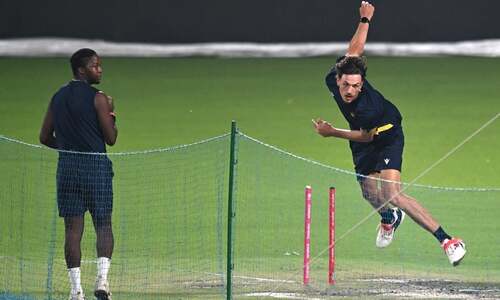LAHORE: The teaching of the English language in Pakistan is class-based as the country’s education system is programmed to provide different levels of English teaching to people belonging to different economic status.
Those who afford go to elite private schools and access better learning material, authentic environments and well-trained teachers whereas the poor and low-income families miss out on the opportunity to learn English up to the standards assumed by society.
This is one of the key findings of a research report on “English language in Pakistan today: Class, the workplace and the shift in language use,” conducted by the British Council. The council on Wednesday launched the summary findings of the report at a local hotel; the full-fledged report would be launched in a couple of months.
The report said the existence of pseudo English-medium schools was rampant in Pakistani society, which claimed to have English as a medium of instruction but the entire conversation and communication between the students and teachers was in Urdu.
It said English was not being taught as a language but rather as a subject, confined to the 40-minute class sessions. It said there was a wide urban-rural divide in the standard of English teaching as people in urban settings had much more choice and better quality of teaching and learning facilities available compared to the rural areas.
The report said English was deeply penetrated into the Pakistani society as it had one of the largest English-speaking populations of the world and claimed that 49pc population (88.69 million people) could speak English.
Speakers at the policy dialogue said English was flourishing in Pakistan and serving as a window to the outer world.
Dr Tariq Rehman, dean of Education Department at the Beaconhouse National University, said there was no uniform policy of national language for every Pakistani child. He said the state and provinces had been pursuing different goals at the same time.
Prof Chris Kennedy, a research fellow at the University of Birmingham, stressed that initial learning should be imparted to children in their mother tongue.
Freelance consultant John McGovern identified that there was confusion between the national language policy and the actual practices in Pakistan. Without a sound policy, he said, all the proposed strategies would prove futile.
British Council’s Regional Director for South Asian Region Stephen Roman said the English language had become a global phenomenon as the United Kingdom no longer owned it as its sole property. He said English was now being owned globally including Pakistan.
He, however, said the English proficiency level amongst teachers in Pakistan was quite poor while 90pc teachers in Punjab were not equipped to teach different subjects in English medium.
Roman said the British Council was making investment to promote the English language through various programmes and initiatives. “Education will be the biggest asset of Pakistan in the days to come. The UK is fully committed to support Pakistan for all English language initiatives,” he asserted.
British Council’s Punjab Director Richard Weyers stressed the need to speak as one voice for promoting the English language in Pakistan.
He said just three per cent population of the Pakistani students at the school and college level had access to private schools imparting proper English language while the rest 97pc were at the mercy of the public schools with no paraphernalia to teach them in English.
Weyers said the British Council’s library in Lahore would become fully functional again by the end of this year.
Journalist and writer Ghazi Salahuddin said proficiency in English or any other second language could not be ensured without imparting education to the school beginners in their first language. He said children’s genius could only flourish by teaching them in their first language. He said English would remain a barrier to progress in Pakistan until this fact was recognised.
Dr Shahid Siddiqui, a linguistics scholar, discussed historical perspective of language evolution in Pakistan. Stressing the connection between the language and society, he termed linguistic capital a pivotal force guiding economic, cultural and social capital of any society.
At the time of independence, he said, Urdu became a strong language in Pakistan and now the same was true for English.
Dr Siddiqui stated that 27 out of 67 languages currently being spoken in Pakistan were endangered.
Earlier, British Council’s Director English Mussarat Shahid shared the key findings of the research and vowed that the council would go the extra mile to bridge the gap between the ever-increasing demand for the English language and the supply of fully-equipped institutions in this regard.
She also highlighted the salient features of the Punjab Education and English Language Initiative (PEELI) launched by the British Council.




























